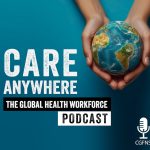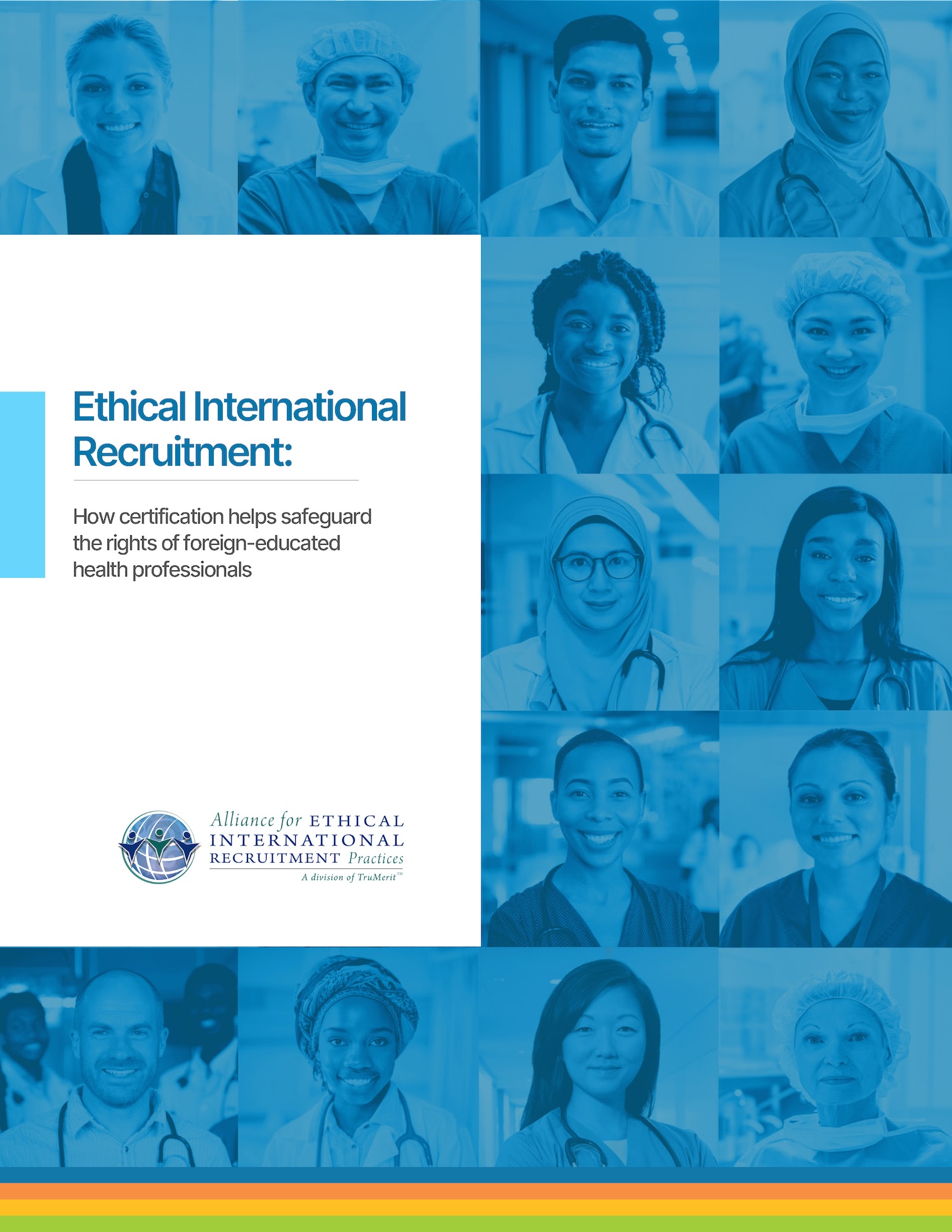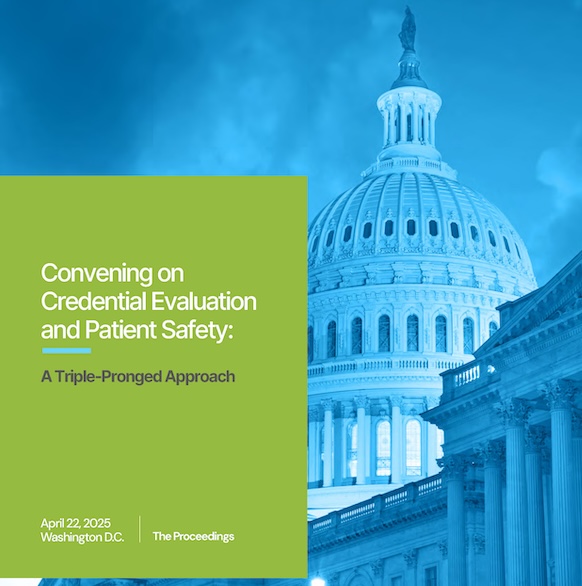Please select the appropriate button below to go the portal login based on your service need.
Webinar on the 2025 State of the World’s Nursing Report
From Recommendations to Reality
How collaboration can advance the state of the world’s nursing
Join us for this roundtable webinar as we unpack the insights and outcomes of the 2025 State of the World’s Nursing Report and explore the implications and opportunities with key thought leaders from global diaspora nursing associations. What key takeaways are these leaders discussing within their organizations? We’ll get their answers to that question and take a look at these important topics:
- Trends and findings related to the global nursing pipeline and nurse workforce challenges.
- Implications for nurse education, credentialing, career mobility, and nurse leadership pathways.
- Opportunities for impactful collaborations and action plans to support the SoWN recommendations.
Moderator: Lea Sims—Chief Marketing and Communications Officer for TruMerit (formerly CGFNS)
Panelists:
Peter Preziosi, PhD, RN, CAE—President & Chief Executive Officer, TruMerit
Yvonne Commodore-Mensah, PhD, MHS, RN, FAAN—President & Co-Founder, Ghanaian Diaspora Nursing Alliance (G-DNA)
Umamaheswari (Uma) Venugopal, MSN, RN, CCRN, NEA-BC—President, National Association of Indian Nurses of America (NAINA)
Marlon Garzo Saria, PhD, RN, AOCNS, NEA-BC, NPD-BC, FAAN—President, Philippine Nursing Association of America (PNAA)
Agatha Ekeh, Ed.D, MSN, RN-PHN—President, National Association of Nigerian Nurses in North America (NANNNA)
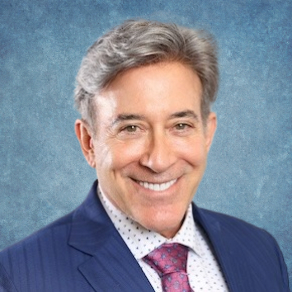
Peter Preziosi
President & Chief Executive Officer
TruMerit
Peter Preziosi, the President and CEO of TruMerit, is a leader in the global effort to strengthen health systems by improving career development and mobility for healthcare workers worldwide.
Dr. Preziosi was appointed to lead the organization in early 2023 when it was known as CGFNS International, the world’s largest credentials evaluation organization for the nursing and allied health professions. Since then, he has led its transformation into a new era of global impact, expanding its mission toward research and advocacy in support of healthcare workforce development solutions, including global standards and frameworks for certification of nurses and other healthcare professionals. This has included rebranding the organization as TruMerit and enlarging its profile to enable healthcare workers everywhere to work at the top of their capabilities and licensure.
Dr. Preziosi has also reinvigorated the organization’s global activism as a member of the Conference of NGOs in Consultative Relationship with the United Nations (CoNGO) and has guided its induction into WHO’s World Rehabilitation Alliance (WRA), a network of stakeholders that advocates for improving rehabilitation management and investment, building a high-quality rehabilitation workforce, and enhancing data collection on rehabilitation. He also served on the WHO steering committee that helped guide preparation of the 2025 State of the World’s Nursing Report.
Prior to joining TruMerit/CGFNS, Dr. Preziosi led quality, standards development, and credentialing at the World Health Organization’s initiative to build a technology-driven global learning center, the WHO Academy, with a goal of upskilling millions of health workers worldwide.

Yvonne Commodore-Mensah
President & Co-Founder
G-DNA
Dr. Yvonne Commodore-Mensah is a renowned cardiovascular nurse epidemiologist with national and international recognition. Her research focuses on reducing cardiovascular disease risk among African populations both in the United States and in Africa through community-engaged research and implementation science. With expertise in immigrant health, global health, cardiovascular disease epidemiology, and social determinants of health, Dr. Commodore-Mensah leads groundbreaking studies to improve cardiovascular outcomes. She serves as the principal investigator for several significant projects, including the ADHINCRA Program, a randomized control trial addressing hypertension control in Africa, and the LINKED-BP and LINKED-HEARTS Programs, which are cluster-randomized controlled trials implementing multi-level interventions to enhance hypertension control and chronic condition management in primary care settings in the United States.
Her contributions to the field have earned her fellowships and awards from the American Academy of Nursing, American Heart Association, and the Preventive Cardiovascular Nurses Association. Her leadership extends to serving on the boards of several prestigious organizations, including the Preventive Cardiovascular Nurses Association, Greater Baltimore and Maryland American Heart Association, Horizon Foundation, and the Nursing is STEM Coalition. As President and Co-founder of the Ghanaian-Diaspora Nursing Alliance (G-DNA), she works to advance nursing and healthcare in Ghana. Dr. Commodore-Mensah directs the Global Cardiovascular Health Equity Lab and co-directs the Cardiometabolic Health Interest Group at Johns Hopkins School of Nursing. Through her research, leadership, mentorship, and advocacy, she continues to make significant strides in advancing cardiovascular health equity and promoting better health outcomes for African communities worldwide.
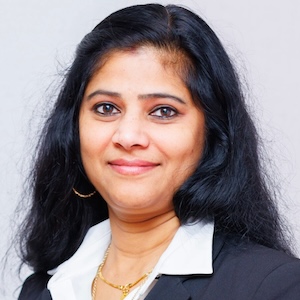
Umamaheswari (Uma) Venugopal
President
NAINA
Mrs. Umamaheswari (Uma) Venugopal, is a versatile leader, mentor, and inspiring role model with over 20 years of experience across various specialties. Her career has included roles such as clinical nurse, preceptor, nurse manager, risk management, administrative supervisor, and drug diversion lead for nursing, among others. Currently, she serves as the President of the National Association of Indian Nurses of America (NAINA) for 2025-2026 and also served as the NAINA Secretary for the 2023-2024 term. She also previously served as the President of the American Association of Indian Nurses of New Jersey Chapter 2 (AAIN-NJ2) from 2021-2022. With a continued passion for leadership and teaching, she exemplifies nursing excellence through transformational and authentic leadership, inspiring and empowering fellow nurses to drive change and improve the health of our nation.
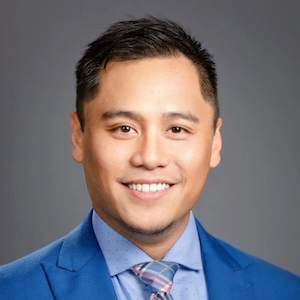
Marlon Garzo Saria
President
PNAA
Dr. Marlon Garzo Saria, a distinguished leader in nursing, professional associations, and military service, proudly embraces his Philippine heritage as a cornerstone of his identity and career. He serves as the Nurse Scientist and Magnet Program Director at Providence Saint John’s Health Center in Santa Monica, California. Additionally, he is a Lieutenant Colonel in the U.S. Air Force Reserve, stationed with the 452d Aeromedical Staging Squadron at March Air Reserve Base, California. As President (2024-2026) of the Philippine Nurses Association of America, Dr. Saria is committed to advocating for improved healthcare and representation within the nursing profession.
Dr. Saria earned his Bachelor’s Degree in Nursing from the University of the Philippines, highlighting his deep-rooted connection to his cultural origins. He furthered his education with a Master of Science in Nursing and a Doctor of Philosophy from the University of California, Los Angeles, complemented by a Master’s degree in Military Operational Art and Science from the Air University, US Air Force.
Dr. Saria is a Coldiron Senior Nurse Executive Fellow at Case Western Reserve University’s Marian K. Shaughnessy Nurse Leadership Academy. He is board-certified in multiple specialties—including Oncology Nursing, Oncology Clinical Nurse Specialist, Advanced Nurse Executive, and Nursing Professional Development Specialist.
Throughout his career, Dr. Saria has been a transformative force in education, research, and leadership. His global perspective is enriched by roles as a Summer Intramural Research Program Fellow at the National Institutes of Health and as a Visiting Researcher at Chiba University in Japan. As Adjunct Faculty at the University of the Philippines College of Nursing, he is committed to nurturing future nurses.
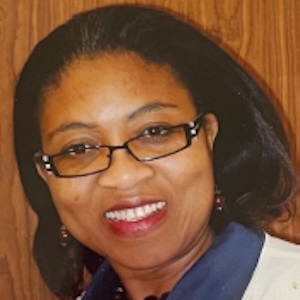
Agatha Ekeh
President
NANNNA
President, National Association of Nigerian Nurses in North America (NANNNA)
Founding President, Northern California Nigerian Nurses Association (NORCALNNA)
Education:
Dr. Agatha Ekeh earned her Bachelor of Science in Nursing (BSN) from San Francisco
State University and MSN in Community Health Nursing from the University of
California at San Francisco (UCSF). She earned her doctorate (Ed.D.) in education
leadership and management from Drexel University, Pennsylvania, with a research
focus on the lived experiences of Nigerian Nurses in Northern California.
Experience:
Dr. Ekeh has over twenty years of experience in solid organ transplant nursing and has
been a nursing educator for over twenty years. She is currently an adjunct faculty at
the University of San Francisco School of Nursing and Health Professions.
Professional Affiliation:
Dr. Ekeh is the founding and current president of the Northern California Nigerian
Nurses Association (NorCalNNA) chapter and the current Chair of the national
NANNNA Education Committee.
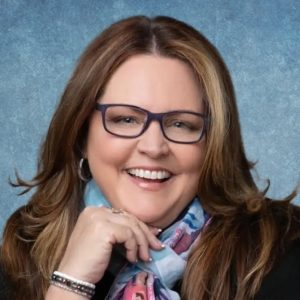
Lea Sims
Chief Marketing and Communications Officer
TruMerit
A veteran marketing and communications executive who has held leadership roles in both the private and public sectors, Lea Sims heads the TruMerit marketing organization and brand transformation strategy. An early career in clinical roles within health systems – including 15 years in healthcare documentation – led to teaching, writing, and ultimately marketing and communications for allied health professions, health information management, and HIT. She has more than three decades of experience in healthcare, most recently as the Global Marketing Lead for Verizon’s healthcare and life sciences practice, where she also led vertical marketing for Verizon Business Group. Prior to that, she served as Director of Professional Practices for the Association for Healthcare Documentation Integrity, a role that required strategic oversight of the association’s marketing, communications, print and digital publications, professional credentialing, government affairs, and advocacy programs. In that role, she authored multiple textbooks, most prominently The Book of Style for Medical Transcription, 3rd Ed., the standards manual used by clinical documentation specialists worldwide. She served as Editor-in-Chief of the association’s print publications and clinical journals, and led the organization through renaming, rebranding, and an industry-wide job task analysis to support the revamping of AHDI’s credentialing programs. With a BA in Education, she’s taught allied health programs within the university system and led curriculum development and revision strategies within both schools and corporate training departments across her career.
Webinar Q&A
The industry is challenged by shortage, displacement, and maldistribution—a triad of restrictive factors around nursing supply that are being felt most keenly on the frontlines of care delivery. There are not enough faculty to recruit and train new nurses; therefore, there are not enough graduates. And there are more opportunities opening to nurses in advanced practice, so the pipeline feeding health systems who are hurting for bedside nursing resources is constrained at both ends.
- Investment in building sustainable nursing career pathways needs to be accelerated at every point along that journey, from nursing school to advanced practice.
- A commitment to invest in workforce development by governments, health systems, and private sector partnerships is the only way to move this needle.
- Health systems partnering with academic institutions to support local outreach, curriculum evolution, transition to practice programs, and even scholarship programs can open the pipeline for recruitment.
- Government funding for nurse training and incentive programs for high-need hospitals could help with distribution of new nurses across critical shortage areas.
- And health systems must invest in sustainable career ladders, compensation structures, leadership development pathways, and (most importantly) care model evolution initiatives to address the challenges that lead to burnout and the decision to leave bedside care.
Since the report addresses the underpinning reality of maldistribution in that projection, the answer is a complicated one. The reduction in shortage is anticipated to come from investments in recruitment and education, but only high-income countries will benefit from that increased supply at the continued detriment to low-to-middle-income countries, where maldistribution of nurses will worsen their supply challenges. And the solutions to address these issues will vary by country based on cause and source.
- For countries like Ghana, where the nursing education pipeline is strong but economic factors are restricting the availability of jobs and forcing nurses to migrate, policy changes and investments need to be made to address struggling economies and the need for infrastructure development.
- In other countries where nursing shortage is attributable to a sluggish educational pipeline and aging faculty workforce, investments need to be made in nursing school recruitment programs—reaching into primary school education to build future-career affinity for nursing, partnering with private sector organizations for scholarship funding, and partnering with hospitals and health systems to shape a supported career pathway from primary school through job placement and licensure.
This is where nurse leaders can engage in data-driven advocacy with health system employers to educate those decision-makers about the downstream impact on the business—especially on the cost and quality of care delivery and on workforce retention—for investing (or neglecting to invest) in mental health benefits for nurses. This is more easily done, of course, in countries where professional nursing associations can provide advocacy resources and where the nursing profession has voice and influence both nationally and within health systems.
We encourage nurses to consider that there has never been a better time to enter the profession, nor has nursing ever had a greater voice, a wider scope of practice, or more influence on the evolution of care delivery, especially in developed countries and advanced health systems. The knowledge and skills of nurses have never been in greater global demand, and there is obvious competition (per the outcomes reported in this SoWN report) for nursing talent around the world. But global nurses need to educate themselves about the challenges outlined in the report, which challenges and opportunities are unique to their countries and health systems, and what their options and choices are when it comes to career opportunity, advancement, and licensure.
The gender inequities around compensation identified in the report were specific to the pay gaps between men and women in the nursing profession, not other care disciplines.
TruMerit does not have “agents” in the international recruitment space, but we advocate for the fair and ethical recruitment of all global nurses seeking migration into another country through our Alliance for Ethical Recruitment. Recruitment firms can seek certification through our Alliance to validate that their recruitment practices comply with the principles outlined in our Ethical Code for international recruitment.
Yes, nurses from LMICs were represented on the SOWN Advisory Group. The task force discussed how the Nursing Now campaign helped elevate the image of nursing through media and community engagement, partnering with National Nursing Associations globally. While the report offers recommendations, their implementation must be tailored to each country’s health system, cultural context, and economic conditions. These discussions also highlighted the importance of developing country-specific strategies to strengthen nursing leadership and amplify nurses’ voices in policymaking.
We are not engaged with any organizations doing this nor are we developing our own resources to support global nurses with professional and political advocacy at this time. However, we would encourage nurses to work with international nursing associations and advocacy organizations to leverage already existing resources and to build in-country coalitions and alliances with other impacted stakeholders—health systems, academic institutions, private sector organizations, and NGOs—to take a collective voice to government leaders and policymakers.
At TruMerit, we are aware of these practices and the role that class and gender discrimination play on nursing career development, recruitment, placement, and advancement. This is why we tirelessly advocate for fair and ethical recruitment, contracting, compensation, and treatment of all nurses and allied health professionals around the world. We hope to extend our certification program for international recruitment to those organizations who are recruiting nurses to other countries (outside of the U.S.) and to ensure our Ethical Code is adopted worldwide.
For nearly fifty years, we have supported foreign-educated nurses and other healthcare workers pursuing careers in the United States through our core services of credentials verification and evaluation. We offer VisaScreen® services for nurses who need to apply for an EB-1 visa with the U.S. government, and we do a comprehensive credentials evaluation, including education comparability, for nurses seeking licensure within a U.S. state. Learn how we support nurses migrating to the U.S..

